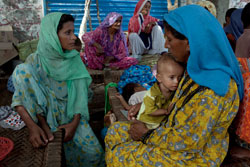Environmental Sustainability and Peace in a Changing World
This event discusses the impact of Climate Change on conflict and sustainable development.
 Volatile rainfall and temperature trends in many parts of the world have exerted significant pressure on available land, water and food resources leading to diminishing food stocks, inadequate water supply, mass migration and desertification. According to the Intergovernmental Panel on Climate Change, rapidly changing variables in the atmosphere could expose an additional 250 million people to increased water stress in Africa by 2020, with yields from rain-fed agriculture dropping by 50%. The likelihood of flooding in Asia could rise from 10 to 40%, affecting lives and livelihood of millions. The loss of biodiversity in Latin America would have global ramifications and could precipitate mass displacement.
Volatile rainfall and temperature trends in many parts of the world have exerted significant pressure on available land, water and food resources leading to diminishing food stocks, inadequate water supply, mass migration and desertification. According to the Intergovernmental Panel on Climate Change, rapidly changing variables in the atmosphere could expose an additional 250 million people to increased water stress in Africa by 2020, with yields from rain-fed agriculture dropping by 50%. The likelihood of flooding in Asia could rise from 10 to 40%, affecting lives and livelihood of millions. The loss of biodiversity in Latin America would have global ramifications and could precipitate mass displacement.
By 2050, water resources in Caribbean and Pacific Islands are expected to be insufficient to meet demand. Subsequently, millions will be pushed from subsistence to desperation and heightened competition for scarce resources would create flash points that could trigger violence. These developments have dire implications for peace and sustainable economic development. This panel will analyze recent trends in climate change, explore the climate-conflict nexus and consider recommendations to address potentially harmful effects and forestall potential violence.
Speakers
- Dr. James Lee
Professor in the School of International Service at American University and author of “Climate Change and Armed Conflict: Hot and Cold Wars” - Shilpa Patel
Chief, Climate Change, International Finance Corporation - Raymond Gilpin, Moderator
Associate Vice President, Center for Sustainable Economies, Centers of Innovation
U.S. Institute of Peace



